Over 30 years of anarchist writing from Ireland listed under hundreds of topics
Loyalism
Nationalism, socialism and partition
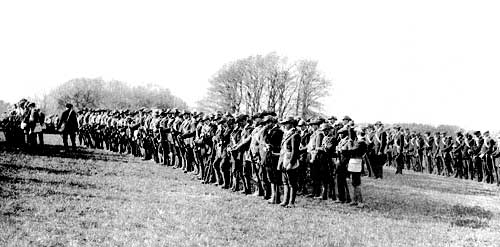 The period of Irish history from the 1880's to the 1920's defined and divided politics including socialist politics, on the island for the rest of the century. The most militant workers struggles occurred in the second half of that period, north and south, concentrated in the last five years. This was also the period of the 1916 insurrection in Dublin, the 1918-21 War of Independence, the treaty and partition of Ireland in 1921 and then in the south the bloody Civil War ending in 1923.
The period of Irish history from the 1880's to the 1920's defined and divided politics including socialist politics, on the island for the rest of the century. The most militant workers struggles occurred in the second half of that period, north and south, concentrated in the last five years. This was also the period of the 1916 insurrection in Dublin, the 1918-21 War of Independence, the treaty and partition of Ireland in 1921 and then in the south the bloody Civil War ending in 1923.
The year 1919 saw the greatest demonstration of the potential of Irish workers, north and south to take over the running of society but the events of the following years cemented the division that would do much to end workers militancy. In terms of working class struggle the periods of militancy of northern and southern workers coincide. Yet the working class was divided and these struggles remained almost completely isolated from each other. (Image: UVF training in 1914)
The partition of Ireland
WSM position paper on the partition of Ireland. Last debated and updated at the April 2009 conference. It sits under the State and Democracy position paper.
The Partition of Ireland
A Workers Solidarity Movement Position Paper
An anarchist opinion on the Dublin anti-loyalist march riot
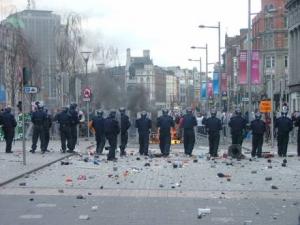 Saturday saw a major riot in Dublin in response to an attempted Loyalist 'Love Ulster' march through the main street of the capital. For three hours hundreds rioted in the city centre, banks and shops were attacked and looted and cars were set on fire. All the political parties including Sinn Fein have condemned the riots but few have analysed what happened. This article first submitted to indymedia.ie suggests the riot shows that "he who sows misery, harvests anger". The author is a WSM member living in Dublin, this is his personal view of events.
Saturday saw a major riot in Dublin in response to an attempted Loyalist 'Love Ulster' march through the main street of the capital. For three hours hundreds rioted in the city centre, banks and shops were attacked and looted and cars were set on fire. All the political parties including Sinn Fein have condemned the riots but few have analysed what happened. This article first submitted to indymedia.ie suggests the riot shows that "he who sows misery, harvests anger". The author is a WSM member living in Dublin, this is his personal view of events.
The 1798 Rebellion
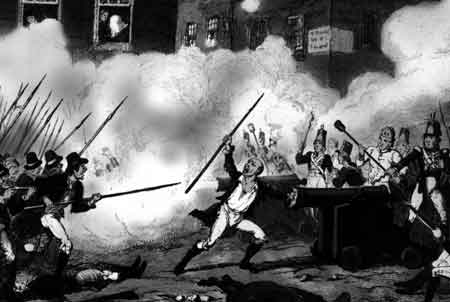 In 1798 Ireland was shook by a mass rebellion for democratic rights and against British rule. 200 years later 1798 continues to loom over Irish politics. The bi-centenary, co-inciding with the 'Peace process', has attracted considerable discussion, with the formation of local history groups, the holding of conferences and a high level of interest in the TV documentaries and books published around the event.
In 1798 Ireland was shook by a mass rebellion for democratic rights and against British rule. 200 years later 1798 continues to loom over Irish politics. The bi-centenary, co-inciding with the 'Peace process', has attracted considerable discussion, with the formation of local history groups, the holding of conferences and a high level of interest in the TV documentaries and books published around the event.
The Orange Order: an enemy of ALL workers
It is unfortunate, if perhaps somewhat inevitable, that the now annual battles around the 'marching season' fall along religious lines. The Orange parades are being used to test the supposed neutrality of the northern regime and the RUC in particular. The losing side in this dangerous game however is likely to be the working class, Protestant and Catholic, as the confrontations and the sectarian attacks that occur around the Orange marches drive people further into 'their own' communities.
UDA cashing in on community funding
Recent fury over our local ruling class giving away £1.7 million of the Social Investment Fund to Charter NI in East Belfast, headed by a suspected leading member of the UDA, is indicative of a continuing corrupt political settlement where there is one rule for the few and another for the rest of us.
The true colours of Loyalism
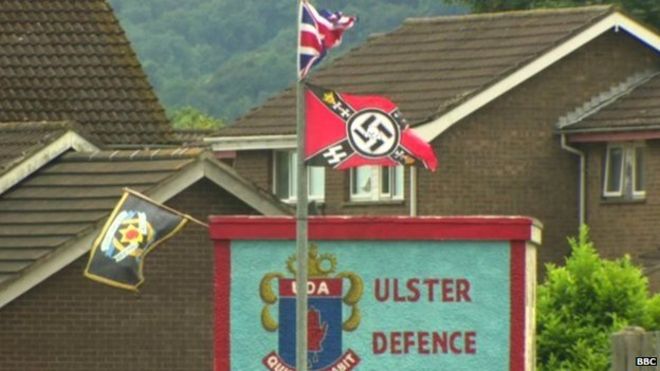 The removal of Confederate and Nazi Flags at loyalist bonfire site in Carrickfergus by local community workers is a positive step forward but this should not detract from a political settlement that rests on accommodating and institutionalizing the most reactionary elements in Northern Ireland, rather than seeking to uproot and transcend sectarian division in this mini colonial statelet.
The removal of Confederate and Nazi Flags at loyalist bonfire site in Carrickfergus by local community workers is a positive step forward but this should not detract from a political settlement that rests on accommodating and institutionalizing the most reactionary elements in Northern Ireland, rather than seeking to uproot and transcend sectarian division in this mini colonial statelet.
As the clock ticks towards the annual Orange Order 12th of July marches, the sectarian marking of territory is underway as working class communities across the North are besieged with Loyalist emblems and paramilitary flags, indirectly facilitated by the PSNI who have turned a blind eye to this showcase of sectarian triumphalism and intimidation towards anyone who is perceived as the ‘other’ from Catholics to ethnic minorities.
British Collusion with Loyalist Murder Gangs in the North of Ireland
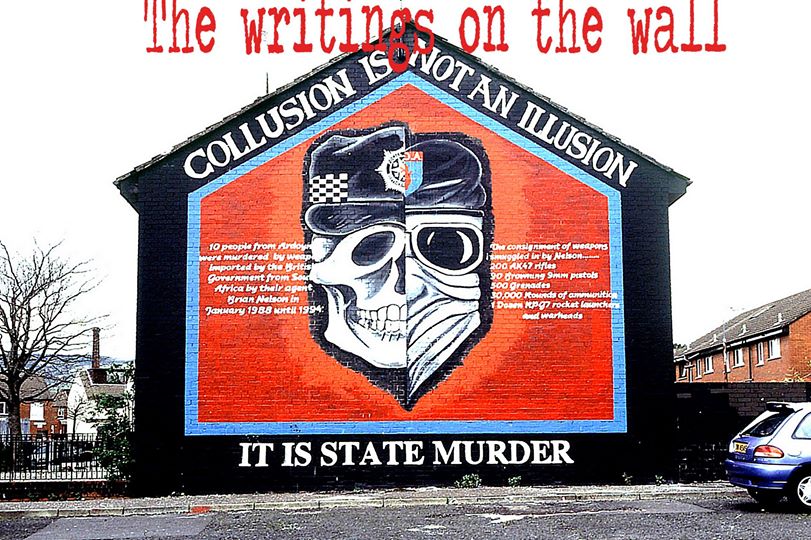 Tomorrow on RTE at 9.30pm there will be a showing of a new documentary that will focus on British government collusion in the north. The documentary makers conducted interviews with many high profile members of British policing in the north from over the last three decades.
Tomorrow on RTE at 9.30pm there will be a showing of a new documentary that will focus on British government collusion in the north. The documentary makers conducted interviews with many high profile members of British policing in the north from over the last three decades.
One such witness, a high ranking RUC officer, brought up the issue of paramilitary collusion personally with Margaret Thatcher, the British prime minister at the time, but the RUC officers concerns were ignored.
The head of special branch at the time, Raymond White said he got message from the British Government on the use of agents in the dirty war, “carry on just don’t get caught”. There are also claims from a member of the loyalist gang that was responsible for the Dublin and Monaghan bombings that the intention of the bombings was to foment civil war in Ireland.
Britains secret dirty war in Ireland - the MRF & FRU
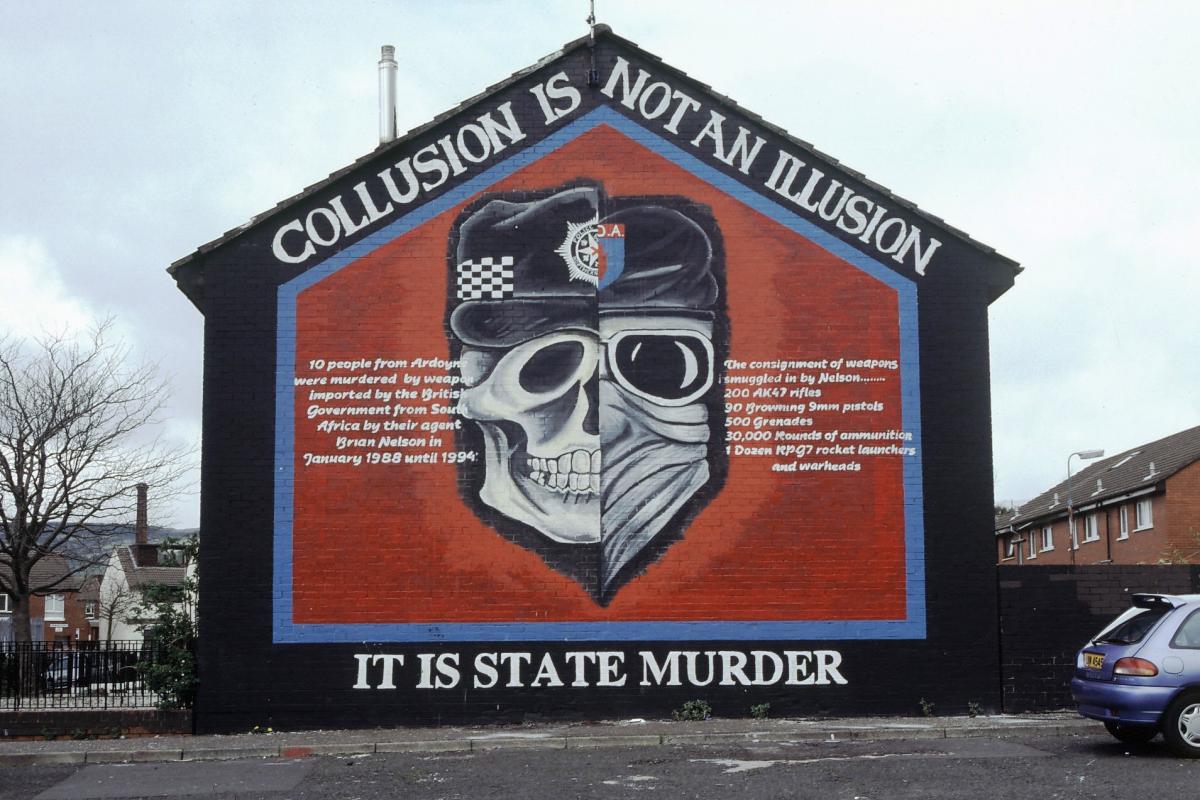 The recent BBC documentary 'Panorama: Britain's Secret Terror Force' may have once again put a spotlight on the extent of British state sponsored terrorism in the North and the activities of its various shadowy forces; but the level of orchestration, impunity, collusion and cover up is yet to be truly uncovered. The documentary revealing the activities of the Military Reaction Force (MRF) was aired just a day after Northern Irish Attorney General John Larkin called for an amnesty on atrocities committed during the Irish troubles. He may be right to break this taboo, but was he lobbied by British soldiers and their friends who fear justice taking its course as this evidence comes to light?
The recent BBC documentary 'Panorama: Britain's Secret Terror Force' may have once again put a spotlight on the extent of British state sponsored terrorism in the North and the activities of its various shadowy forces; but the level of orchestration, impunity, collusion and cover up is yet to be truly uncovered. The documentary revealing the activities of the Military Reaction Force (MRF) was aired just a day after Northern Irish Attorney General John Larkin called for an amnesty on atrocities committed during the Irish troubles. He may be right to break this taboo, but was he lobbied by British soldiers and their friends who fear justice taking its course as this evidence comes to light?Stormont plan to scrap Housing Executive as Flag protests continue
In the midst of a media storm over the flag protests our local politicians have one again nailed their colours to the flag that does not distinguish between green and orange- that of capital and greedy profiteering. The proposal by Stormont minister Nelson McCausland to scrap the Housing Executive originally set up to provide fair allocation of public housing is another pillar in the ongoing savage attacks on our class.

